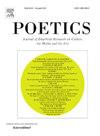Divergences and convergences across European musical preferences: How taste varies within and between countries
IF 2
2区 社会学
0 LITERATURE
引用次数: 0
Abstract
When investigating relational structures in culture, research in Europe has often either mapped the relationship between cultural tastes in a particular context, or mapped differences in cultural tastes (measured consistently) in different countries, without assessing how these differences can vary across them. Indeed, the idea of national homology (namely that the structures of cultural capital would be fairly similar in nations across Europe) has never been really tested, probably due to a lack of cross-national research on cultural preferences. Using data from the EUCROSS survey that took place in Denmark, Germany, Italy, Romania, Spain and the UK (2012–2013, n = 6016), we first use multiple correspondence analysis to estimate the relationships between a set of items on musical tastes. We then extend this through the use of class-specific analysis, to investigate how these relationships vary in each of the six countries. Finally, we analyse the relationships between the underlying dimensions of music tastes and different components of cosmopolitanism, compared with key demographic variables. We show that the musical field significantly varies across the nations represented in the survey, demonstrating that musical preferences remain largely anchored in national contexts. Cultural preferences are shaped by historical and social dynamics specific to each country, with significant variations in the symbolic value and demographic associations of music genres.
欧洲音乐偏好的差异和趋同:国家内部和国家之间的品味如何变化
在调查文化中的关系结构时,欧洲的研究通常要么绘制出特定背景下文化品味之间的关系,要么绘制出不同国家文化品味的差异(一致测量),而没有评估这些差异如何在它们之间变化。事实上,国家同源性(即欧洲各国的文化资本结构相当相似)的观点从未得到过真正的检验,这可能是由于缺乏对文化偏好的跨国研究。利用在丹麦、德国、意大利、罗马尼亚、西班牙和英国(2012-2013,n = 6016)进行的EUCROSS调查的数据,我们首先使用多重对应分析来估计一组音乐品味项目之间的关系。然后,我们通过使用特定类别的分析来扩展这一方法,以调查这些关系在六个国家中的差异。最后,我们分析了音乐品味的潜在维度与世界主义的不同组成部分之间的关系,并与关键的人口变量进行了比较。我们表明,在调查中所代表的国家之间,音乐领域存在显著差异,表明音乐偏好在很大程度上取决于国家背景。文化偏好受到每个国家特定的历史和社会动态的影响,在音乐流派的象征价值和人口关联方面存在显著差异。
本文章由计算机程序翻译,如有差异,请以英文原文为准。
求助全文
约1分钟内获得全文
求助全文
来源期刊

Poetics
Multiple-
CiteScore
4.00
自引率
16.00%
发文量
77
期刊介绍:
Poetics is an interdisciplinary journal of theoretical and empirical research on culture, the media and the arts. Particularly welcome are papers that make an original contribution to the major disciplines - sociology, psychology, media and communication studies, and economics - within which promising lines of research on culture, media and the arts have been developed.
 求助内容:
求助内容: 应助结果提醒方式:
应助结果提醒方式:


